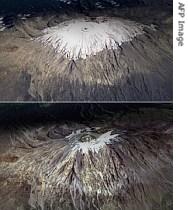2006年VOA标准英语-Conference: Africa More Vulnerable to Climate C(在线收听)
By Alisha Ryu
Naivasha, Kenya
15 November 2006
Environmentalists and scientists attending a major U.N. climate change conference in Nairobi, Kenya are warning that Africa is significantly more vulnerable to the effects of climate change than any other continent. Climate change in east Africa is worsening environmental problems, especially pollution and deforestation.
---
 In one visible example of cliamte change in east Aftica, combo satellite images show two perspective views of Tanzania's Mount Kilimanjaro on Feb. 17, 1993 (top) and Feb. 21, 2000 (bottom) |
||
Watching dark storm clouds gather over the 250-square-kilometer lake, Mukasa's weathered face breaks into a smile. Rain is coming and that is good news for him.
Mukasa says he has noticed that droughts in Kenya have become longer and more frequent in recent years, sometimes leaving the water levels in the lake dangerously low. But he says it has been raining much more than usual this year and the fish are thriving.
In the Eastern Rift Valley, it is not just fishermen who depend on the fresh waters of Lake Naivasha for their survival.
The lake hosts a large number of hippos and nearly 500 species of birds, which attract thousands of tourists every year.
The lake also plays a vital role in Kenya's economy by irrigating some 100 square kilometers of vegetable and flower farms in Naivasha that generate net revenues of nearly $65 million a year.
The farms employ an estimated 30,000 migrant workers, who, along with Naivasha's 250,000 permanent residents, rely on the lake for much of their daily water needs.
But the monitoring officer for a local wetlands association, Bogo Kamau, says the lake has begun showing clear signs of stress and degradation in recent years.
"What I have noted is that the lake levels have gone down,” he said. “It is tending toward a saline lake. Also, the color of the water has changed."
Kamau says the changes are occurring because tributaries of the two main rivers which feed Lake Naivasha, are no longer bringing as much fresh water as is needed to dilute some of the waste, salts, and minerals in the lake.
Environmentalists say the tributaries are contributing less water because severe deforestation in the local mountains, combined with warmer temperatures, is affecting the amount of rain that falls in the area every year.
George Otiang'a-Owiti is the head of Kenya Wildlife Service Training Institute in Naivasha. He notes that the lake's ecosystem is so extensive, interdependent, and fragile, anything that upsets the balance can devastate it.
For example, Owiti says African cape buffalos, which have lost much of their nearby forest habitat, are threatening the health of the lake.
"Because of deforestation, the buffalos have now moved toward the lake area here,” he noted. “And because of that, the buffalos are trodding over the papyrus, which is a very good filter for the water in the lake. And the buffalos graze on the papyrus and this, of course, does not allow regeneration of the papyrus."
In the Kenyan capital Nairobi, many of the specialists attending the two-week U.N. talks on climate change have been urging the world's wealthy nations to pay greater attention to the effects of global warming, which they say could soon destroy entire communities in poverty-striken areas of Africa.
The United States and Australia have been especially criticized for not signing the 1997 Kyoto Protocol, which requires industrialized countries to greatly reduce their greenhouse gas emissions by 2012. The emissions, caused by burning of fossil fuels, are believed to be largely responsible for the earth's rising temperatures that have affected weather patterns.
But Bogo Kamau says he thinks local people must also be educated and taught to do their part in protecting and preserving their environment and livelihoods.
"We do not need to criticize what other people are doing,” he said. “We need to also change, to realize that you are also part of the problem."
John Stanton is the vice president of National Environmental Trust, a Washington-based, non-profit organization. He says to increase local participation in conservation efforts, one option being discussed at the U.N. climate change conference is to provide incentives for communities to preserve their forests.
"For communities that allow the forests to remain standing, they would actually be provided a financial reward and that would serve many developmental goals, including habitat conservation, clean-water benefits," he explained.
In Lake Naivasha, undisturbed forests mean financial security and a better life for many people, including fisherman Michael Mukasa.
Scooping up some water with his hands, Mukasa says he cannot imagine what his life would like if something were to happen to the lake.
"It would be very bad and everyone here would know what suffering really is," he said.